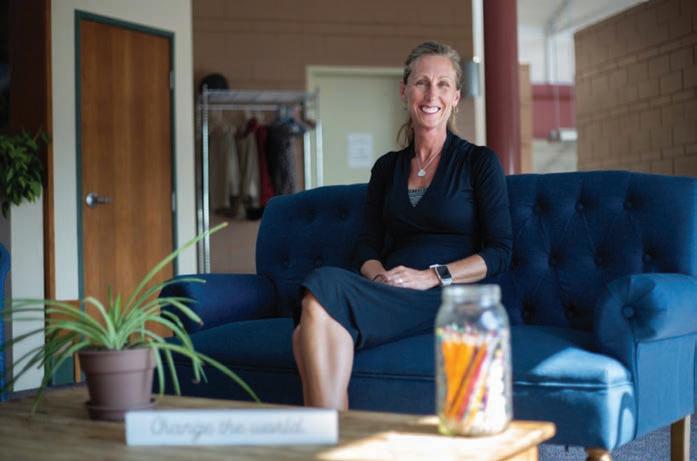
3 minute read
HOLOCAUST
Sladek has been speaking about his experience for many years, and last year he also published a memoir, titled Escape to the Tatras: A Boy, A War and a Life Interrupted. Before the event he donated a copy to the Aurora Public Library, which will be available to readers.
e event was a partnership between the City of Aurora’s O ce of Diversity, Equity and Inclusion and the Mizel Museum in Denver. More than 100 people attended the event in person at Aurora’s city council chamber, with more watching on a livestream.
Aurora Mayor Mike Co man and Councilmember Danielle Jurinsky introduced Sladek. Co man described the Holocaust as “among the most horri c events in human history” and said it’s important to remember those who were lost.
“Programs like these serve as a stark reminder of the importance of standing up to hatred and injustice,” Co man said, which he said is especially important for a city as diverse as Aurora.
Jurinsky, who is Jewish, said that Sladek’s story speaks to the importance of standing up to antisemi- tism and reminded her of the value of living “in a free nation.” e event began with the viewing of a prerecorded talk from Sladek where he discussed his family’s life before and during WWII in the city of Prešov. Prior to the rise of Hitler Sladek said that Czechoslovakia was a good place for Jews to live, but that antisemitic propaganda turned people against his community and persisted after the war.
“One day we will have no survivors left and we must continue to teach the horrors of the Holocaust to the younger generation,” she said.
“It’s not so easy to get rid of brainwashing,” he said.
After the Nazi occupation of Czechoslovakia, Jewish people in his town began to be rounded up and deported to concentration camps. A Christian judge who was a friend of the family helped warn them of when raids were coming, but Sladek’s family decided to smuggle him across the border to Hungary to live with a relative. His mother told him that he had to pretend to be an orphan if he wanted to survive.
Sladek lived in Hungary for a year, but it was then also occupied by the Nazis, and his parents decided to bring him back. He was smuggled back across the border inside a hay wagon, and said at one point at a checkpoint Nazi soldiers stabbed their bayonets into the hay barrels, almost catching him.
His family ultimately escaped into the Tatra mountains with a group of other civilians following the Partisan ghters, who’s bravery and courage Sladek said he remembers with fondness. at’s where they were when the war ended in 1945.
Despite everything he went through, including losing all of his cousins and many other family members in the Holocaust, Sladek said he rejected bitterness and still chose to trust in other people.
“I don’t know how to hate,” he said. “I went through all those things, all those di cult times, but I guess God didn’t give me that special ability to hate. I love people.”
After the video, Sladek answered questions from the audience. His natural humor and charm shone through despite the dark subject matter, and he drew laughs on a number of occasions. One man said that Sladek had been his teacher at a Denver synagogue 57 years ago.
“I probably did the right thing by you, right? If I was a nasty teacher you wouldn’t be here today,” he joked.
Sladek said watching his country slide into fascism as a child made him passionate about the importance of safeguarding democracy, something he always emphasizes when speaking to groups of young people. e fact that a room full of people from various backgrounds were all sitting together and listening to him share his story is an example of the way things should be, he said. He encouraged the audience to stand up to displays of bigotry.
“Even though we live in a democracy, there’s no guarantee that next week we are still going to be in a democracy,” he said.
He said he’s also concerned by a rise in antisemitism, which is something he said he never expected to have to be worried about in the U.S. However, he said he feels very safe in this country in part because unlike Slovakia, where Jews were one of the only minority groups, the U.S. is a diverse nation.
“If society decides to persecute a certain segment, we are all a victim of that,” he said.
“We are people who love other people and we believe in a society that is made up of all kinds of people,” he said. “ at’s what I believe in.” is Aurora Sentinel story via e Associated Press’ Storyshare, of which Colorado Community Media is a member.










